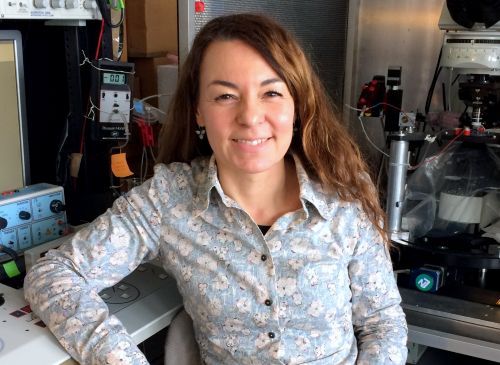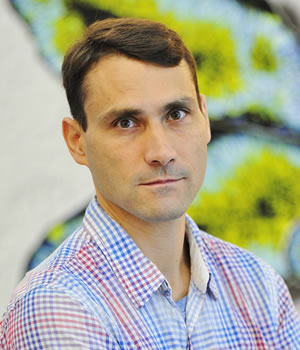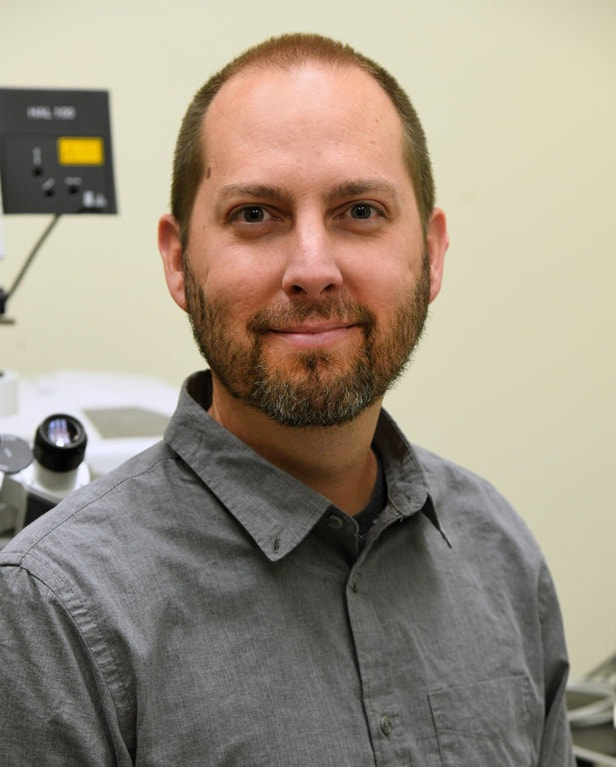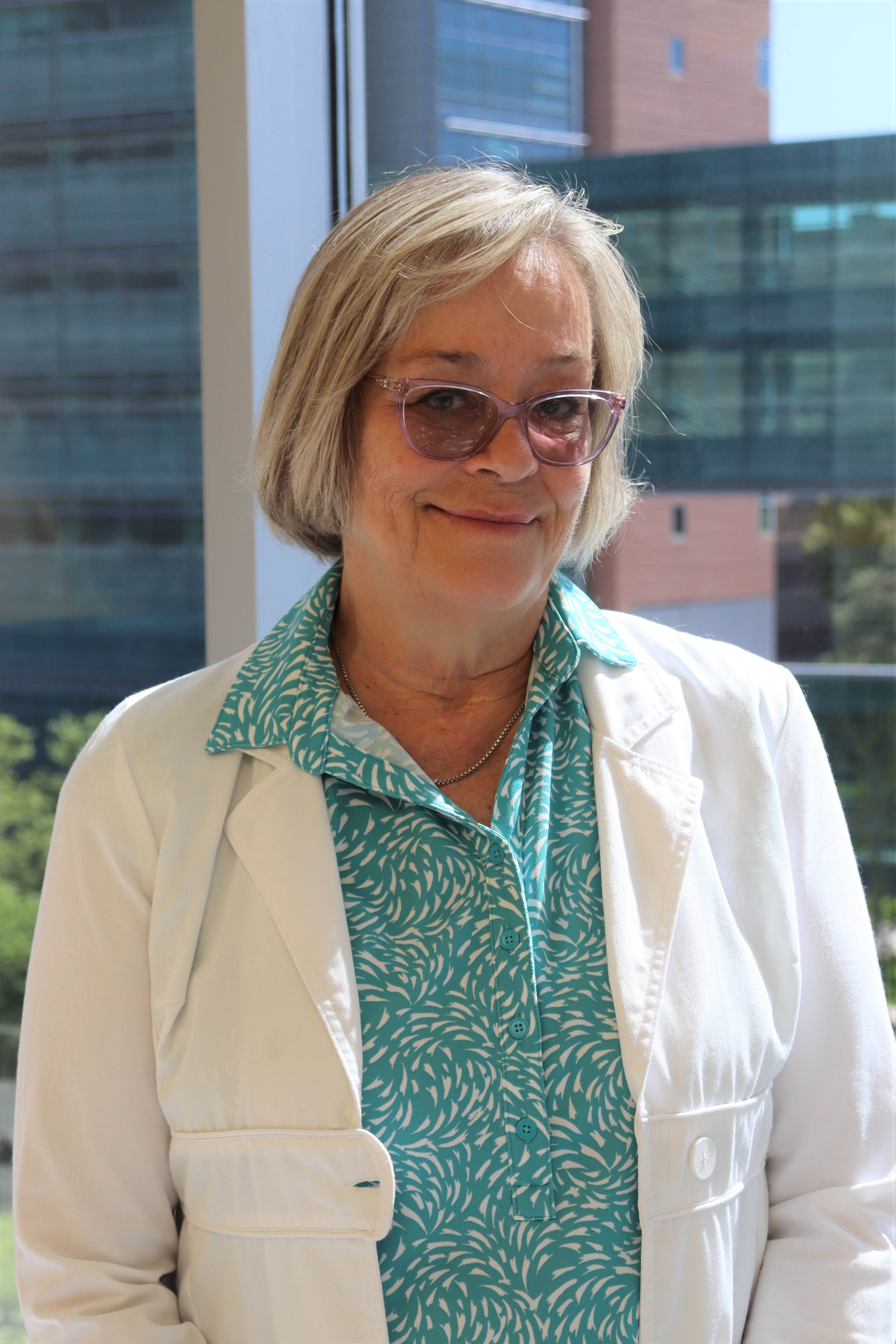Faculty and Research
Neuroscience faculty provide world-class PhD training in neuroscience research. Our faculty represent over 13 basic science and clinical departments across the Anschutz campus including Physiology and Biophysics, Pharmacology, Cell and Developmental Biology, Pediatrics, Anesthesiology, Psychiatry, Neurology, Neurosurgery, and many others. Our faculty are well-supported researchers, passionate teachers, and dedicated mentors who carry out their research in close collaboration with their graduate students and postdoctoral fellows.
Faculty and Research Specializations
Search
Filter results by:
Mazen Al Borno PhD
Assistant Professor
Research Focus:
Computational Neuroscience
Neuroengineering
Systems Neuroscience
Without being conscious of it, our motor system is constantly solving computationally challenging problems in ways that astonish both roboticists and neuroscientists. We develop computational models of animal movement to understand how the brain generates movement and design novel rehabilitation therapies and assistive devices for patients with movement disorders. We collaborate closely with neuroscientists, clinicians and roboticists to study the brain and help patients achieve a better quality of life.
Email:[email protected]
Allyson Alexander MD, PhD
Assistant Professor
Completed Mentor Training Course
Research Focus:
Disease and Developmental Disorders
Epilepsy
I study basic mechanisms of how epilepsy develops using human and mouse models.
Email:[email protected]
Jason Aoto PhD
Associate Professor
Pharmacology and Molecular Medicine Program Director
Completed Mentor Training Course; Completed Upstander/Bystander Training
Research Focus:
Accepting Students
Cell and Molecular Neuroscience
Disease and Developmental Disorders
Neuropharmacology
Signal Transduction
Synaptic Physiology
We employ cutting-edge approaches including mouse genetics, optogenetics, viral circuit tracing, ex vivo slice electrophysiology, CRISPR/cas9 genome editing, single-cell RNA-sequencing and super-resolution microscopy to investigate how disease-relevant synaptic molecules are utilized in a cell-type- and synapse-specific manner in neural circuits implicated in neuropsychiatric disorders and addiction.
Email:[email protected]
Bruce Appel PhD
Professor
Completed Mentor Training Course
Research Focus:
Accepting Students
Developmental Biology
Developmental Neuroscience
Glia
We investigate the genetic, molecular and cellular basis of brain development and myelination using zebrafish as a model system.
Email:[email protected]
Tracy Bale PhD
Professor
Research Focus:
Developmental Neuroscience
Neuroendocrinology
Developing mouse models of stress sensitivity using genetic and prenatal manipulations to understand the mechanism and heritability for increased susceptibility to neurodevelopmental disorders. Examine the effects of maternal and paternal stress on fetal development and long-term physiological and behavioral responses.
Email:[email protected]
John Bankston PhD
(He/Him/His)
Associate Professor
Completed Mentor Training Course; Completed Implicit Bias Training
Research Focus:
Cardiovascular & Pulmonary Biology
Cellular Physiology
Developmental Neuroscience
Ion Channels & Biophysics
Macromolecular Structure
Neuroendocrinology
Neuropharmacology
Signal Transduction
We are interested in the molecular mechanisms of cellular excitability in the heart and brain. Our focus is on two different families of ion channels, the acid-sensing ion channels (ASICs) and hyperpolarization-activated cyclic nucleotide-modulated (HCN) channels. We study the structural and physiological mechanisms of channel function for each class of channel including how these channels are regulated by other proteins as well as the lipid membrane. To do this we use a combination of patch clamp, FRET, single-molecule fluorescence, and biochemistry.
Email:[email protected]
Linda Barlow PhD
Professor
Completed Mentor Training Course; Completed Upstander/Bystander Training
Research Focus:
Developmental Neuroscience
Sensory Systems
Stem Cells
We use in vivo molecular genetic mouse models, and in vitro taste organoids derived from adult lingual stem cells to understand how taste buds renew during normal homeostasis, and how this regenerative process is impacted by cancer therapies that cause taste dysfunction in patients.
Email:[email protected]
Emily Bates PhD
(She/Her/Hers)
Associate Professor
Completed Mentor Training Course
Research Focus:
Accepting Students
Developmental Biology
Developmental Neuroscience
Disease and Developmental Disorders
Fly Research Group
Genomics Bioinformatics
Glia
Neuropharmacology
We study how ion channel activity (bioelectricity) contributes to morphological development in multiple tissues (craniofacial structures, fly wings, brain, pancreas, and bone).
Email:[email protected]
Ulli Bayer PhD
Professor
Completed Mentor Training Course
Research Focus:
Accepting Students
Cell and Molecular Neuroscience
Disease and Developmental Disorders
Ion Channels & Biophysics
Neuropharmacology
Signal Transduction
Structural Biology
Synaptic Signaling and Plasticity
Our field is molecular and cellular neuroscience. Specifically, we are interested in the molecular and cellular mechanisms underlying learning, memory and cognition. We also want to know how these mechanisms go wrong in disease, and how this could be repaired by new therapeutic strategies.
Email:[email protected]
Ece Bayram MD, PhD
Assistant Professor
Research Focus:
Cognitive Neuroscience
Disease and Developmental Disorders
Neurodegenerative Parkinsonian disorders are common and burdensome diseases. We focus on understanding risk and improving diagnostic approaches for all affected by these diseases. Our current projects include sex differences for genetic and environmental risk factors, social determinants, diagnostic tools, clinical profile, progression, impact on daily life, pathology and clinicopathological correlations in synucleinopathies (Parkinson’s disease, dementia with Lewy bodies, multiple system atrophy) and tauopathies (progressive supranuclear palsy, corticobasal syndrome), and we leverage existing human data. We also prioritize outreach, education, and communication for the community and trainees in STEM to improve access to research.
Email:[email protected]
Kurt Beam PhD
Distinguished Professor
Research Focus:
Ion Channels & Biophysics
My lab investigates intracellular calcium signals, which play essential roles including the activity-dependent regulation of gene expression in diverse cell types, muscle contraction, and neuronal plasticity. We use a variety of techniques including molecular biology, electrophysiology, biochemistry, and analysis of structure.
Email:[email protected]
Timothy Benke MD, PhD
Professor
Research Focus:
Accepting Students
Cell and Molecular Neuroscience
Developmental Neuroscience
Disease and Developmental Disorders
Epilepsy
Ion Channels & Biophysics
Neuropharmacology
Synaptic Physiology
Synaptic Signaling and Plasticity
My laboratory studies the function of synapses, the primary means of communication between neurons in the brain. Discoveries include mechanisms for synaptic changes that are likely associated with learning and memory. Research is directed at discovering how synapses change with development and following seizures. Our results are specifically directed to help prevent and treat the effects of early-life seizures (ELS), which can include autism, learning impairment and epilepsy.
Email:[email protected]
Jeffrey Bennett MD, PhD
Professor
Research Focus:
Neuroimmunology
My research focuses on antigen identification in optic neuritis, multiple sclerosis, neuromyelitis optica, and ocular inflammatory disorders.
Email:[email protected]
Stephanie Bonney PhD
(She/Hers)
Assistant Professor
Completed Mentor Training Course
Research Focus:
Accepting Students
Cell Biology
Cellular Physiology
Cerebrovasculature
Down Syndrome & Alzheimer's
Human
Mouse Models
Neurobiology of Stroke
Neuroimmunology
Deterioration of brain vasculature is linked to neurodegenerative diseases like Alzheimer’s Disease (AD). This impairs oxygen delivery and disrupts waste clearance, contributing to amyloid-beta accumulation in AD and therefore worsens neuronal and vascular health. Perivascular cells are a vulnerable cell population in AD that control vascular stability and dynamics. We use in vivo imaging, 3D-electron microscopy, and transcriptomic approaches to study 1) how early degeneration of perivascular cells in AD contributes to vascular dysfunction, 2) the mechanisms perivascular cells utilize to regulate vasomotor dynamics, and 3) the ultrastructural and signaling interactions between perivascular cells along the vascular wall.
Email:[email protected]
Kimberley Bruce PhD
Associate Professor
Completed Upstander/Bystander Training
Research Focus:
Disease and Developmental Disorders
Neuroendocrinology
Neuropharmacology
Many neurodegenerative diseases such as multiple sclerosis and Alzheimer's disease (AD) are more prevalent in women and have a marked impact on physical and mental health. Female sex is a major risk factor for late-onset AD, and females carrying the APOE4 gene are more likely to develop severe AD. Despite these well-known associations, the reason for this increased risk is unclear. Recent work from Dr. Bruce's laboratory has shown that females have enhanced fat and cholesterol metabolism in specialized brain cells, which may be detrimental in the presence of AD risk factors such as APOE4.
Email:[email protected]
Joseph Brzezinski PhD
Associate Professor
Completed Upstander/Bystander Training, Completed Mentor Training Course, Completed Equity Certificate
Research Focus:
Developmental Neuroscience
Gene Regulation
Sensory Systems
We are interested in uncovering the mechanisms that regulate mammalian retinal development and applying this knowledge to inform novel stem cell based treatments that restore vision. We primarily use mice and human retinal organoids as model systems.
Email:[email protected]
John Caldwell PhD
Professor
Research Focus:
Cell and Molecular Neuroscience
Neuroengineering
Alzheimer’s Disease is associated with plaques of beta amyloid protein in the brain. Beta amyloid is a cleavage product of the amyloid precursor protein (APP). The structure of APP suggests that it acts as an adhesion molecule and/or a signaling receptor, but the normal function of this protein remains unknown. APP is located at synapses in the central and peripheral nervous systems. We are using transgenic mice that express truncated APP to study the role of APP in establishing and maintaining the structure and function of the neuromuscular synapse.
Email:[email protected]
Laurence Cathala PhD
Associate Research Professor
Research Focus:
Cognitive Disorders
Developmental Neuroscience
Optogenetics
Synaptic Signaling and Plasticity
The long-term goal of my research is to elucidate the synaptic and cellular mechanisms that shape information processing and plasticity in neuronal circuits. Using a combination of patch-clamp electrophysiology, two-photon imaging, optogenetics, and super-resolution (STED) immunocytochemistry, we investigate how cerebellar interneurons receive, integrate, and transform neural signals. Our work seeks to define the circuit-level principles that support sensory–motor integration and learning.
Email:[email protected]
Jason Christie PhD
Professor
Research Focus:
Accepting Students
Disease and Developmental Disorders
Ion Channels & Biophysics
Neuropharmacology
Synaptic Physiology
Systems Neuroscience
The Christie Lab endeavors to understand the neural-circuit-mechanisms that underlie the learning-dependent optimization of behavior. The lab’s approach mainly focuses on the cerebellum, a brain region that guides adaptive updating of simple reflexive movements as well as experience-driven refinement of high-order brain function (e.g., thinking, planning, and decision making).
Email:[email protected]
Alberto Cruz Martin PhD
Associate Professor
Research Focus:
Accepting Students
Cell and Molecular Neuroscience
Cell Biology
Cellular Physiology
Computational Neuroscience
Developmental Neuroscience
Disease and Developmental Disorders
Neuroimmunology
Synaptic Physiology
Synaptic Signaling and Plasticity
The Cruz-Martín Neural Circuits Lab investigates how immune pathways shape brain wiring, plasticity, and vulnerability to psychiatric disorders. Leveraging cutting-edge tools—from in vivo two-photon calcium imaging and STED super-resolution microscopy to spatial transcriptomics and cell-type–resolved transcriptomic mapping—we probe how complement-mediated signaling modulates interneuron connectivity and circuit function. We further examine how environmental perturbations like early-life stress intersect with genetic and neuroimmune susceptibility in schizophrenia. Our integrative, multi-scale approach illuminates the cellular and molecular mechanisms underlying brain disorders and may pave the way for more precise circuit-based interventions.
Email:[email protected]
Fabrice Dabertrand PhD
Associate Professor
Completed Upstander/Bystander Training; Completed Implicit Bias Training; Completed Mentor Training Course
Research Focus:
Accepting Students
Cardiovascular & Pulmonary Biology
Cardiovascular and Pulmonary Neuroscience
Disease and Developmental Disorders
Ion Channels & Biophysics
Neurological Disorders and Stroke
Neuropharmacology
Signal Transduction
The control of cerebral blood flow by ion channels and calcium signaling in the pericytes, endothelial cells, and smooth muscle cells that constitute the parenchymal microcirculation, and use this information to combat brain diseases with a vascular component.
Email:[email protected]
Mark Dell'Acqua PhD
Professor
Completed Mentor Training Course; Completed Upstander/Bystander Training
Research Focus:
Cell Biology
Ion Channels & Biophysics
Neuropharmacology
Signal Transduction
Synaptic Signaling and Plasticity
My laboratory’s specific research in the area of neuropharmacology focuses on understanding how cAMP and calcium second messenger signaling pathways are organized at the postsynaptic specializations of excitatory neuronal synapses and how these mechanisms are impacted in neurodegenerative and neurodevelopmental disorders.
Email:[email protected]
Daniel Denman PhD
(He/Him)
Assistant Professor
Completed Mentor Training Course
Research Focus:
Computational Neuroscience
Neuroengineering
Optogenetics
Sensory Systems
Systems Neuroscience
We are interested in how populations of neurons generate sensory perceptions. We use quantitative psychophysics, in vivo electrophysiology and neurostimulation, in vivo imaging, circuit tracing, optogenetics, and computational methods to study and manipulate the dynamics of populations of single neurons. We are also focused on how neural interactions specifically - within areas and distributed across the brain - generate successful perceptions.
Email:[email protected]
Caroline Dias MD, PhD
Assistant Professor
Completed Upstander/Bystander Training; Completed Implicit Bias Training; Completed Raising a Resilient Scientist Training
Research Focus:
Cell and Molecular Neuroscience
Developmental Neuroscience
Disease and Developmental Disorders
The Dias Lab is broadly interested in the genetic basis of human brain function. We are interested in better understanding the molecular mechanisms underlying the healthy human brain as well as neurodevelopmental, psychiatric, and neurodegenerative disorders. In order to do this, we are tackling two major challenges in the field- cellular and clinical heterogeneity.
Email:[email protected]
Robert Dietz MD, PhD
Assistant Professor
Completed Upstander/Bystander Training, Completed Mentor Training Course
Research Focus:
Neurological Disorders and Stroke
Neuropharmacology
Synaptic Physiology
Strategies for restoration of synaptic plasticity following cerebral ischemia.
Email:[email protected]
David DiGregorio PhD
(He/HIm)
Professor and Chair
Research Focus:
Cell and Molecular Neuroscience
Computational Neuroscience
Disease and Developmental Disorders
Neuroengineering
Synaptic Physiology
Systems Neuroscience
In the DiGregorio Lab, we use electrophysiology, optophysiology, super-resolution imaging, and computational tools to investigate the synaptic basis of neural circuit dynamics underlying behavior. We aim to understand how molecular determinants influence synaptic strength, and how the resulting diversity in synaptic properties is utilized by neural circuits to drive and modulate behavior.
Email:[email protected]
Tahra Eissa PhD
(She/Hers)
Assistant Professor
Completed Mentor Training Course
Research Focus:
Accepting Students
Cognitive Neuroscience
Computational Neuroscience
Disease and Developmental Disorders
Systems Neuroscience
I am interested in how we learn adapt our decision-making strategies to different environments. Using a combination of online crowdsourced behavior, computational modeling, and human brain recordings, I hope to answer questions about how our decision strategies change in different environments, how the brain implements these strategies, and how neurological and psychiatric disorders impact these processes.
Email:[email protected]
Gidon Felsen PhD
(He/Him)
Professor
Completed Mentor Training Course
Research Focus:
Accepting Students
Cellular Physiology
Cognitive Neuroscience
Computational Neuroscience
Disease and Developmental Disorders
Molecular Nutrition & Metabolic Systems
Neuroengineering
Optogenetics
Systems Neuroscience
The Felsen lab studies the neural circuit basis of behavior and decision making. We use electrophysiological, behavioral, pharmacological, molecular, and computational methods to examine how sensory input is transformed into plans for motor output, and how movements in turn affect sensory perception and representations. We are interested in how these processes occur in the normal brain, as well as how they are affected by pathological conditions.
Email:[email protected]
Ana I. Fernandez-Marino MSc, PhD
Assistant Professor
Completed Mentor Training Course
Research Focus:
Accepting Students
Cardiovascular & Pulmonary Biology
Ion Channels & Biophysics
Neuropharmacology
Structural Biology
We are a multidisciplinary laboratory uncovering how voltage-gated ion channels are controlled and how failure in their regulation leads to human disease. By integrating high-resolution structural biology with rigorous electrophysiology for functional determination, we aim to bridge from biophysics into physiology. We are particularly interested in studying how disease-causing mutations re-shape channel gating and pharmacology. Our goal is to translate mechanistic insight into therapeutic opportunities by identifying the different states of ion channel regulation for targeted modulation. Ultimately, we aim to give mechanistic insight to disease and lay the foundations for precision intervention in channelopathies.
Email:[email protected]
Thomas Finger PhD
Professor
Research Focus:
Developmental Neuroscience
Systems Neuroscience
A major emphasis in my laboratory is on questions concerning the development and organization of these systems in several vertebrate models. Three major areas are under investigation at present: 1) morphology and function of solitary chemosensory cells (see Finger et al. PNAS 2003) in protection of the airways and gut, 2) the cellular organization and development of taste buds (see Finger et al, Science 2005, and 3) regulation of feeding behavior by taste and other oropharyngeal chemoreceptors.
Email:[email protected]
Christopher Ford PhD
Professor
Completed Upstander/Bystander Training; Completed Mentor Training Course
Research Focus:
Accepting Students
Disease and Developmental Disorders
Neuropharmacology
Signal Transduction
Synaptic Physiology
Systems Neuroscience
Our lab examines how neuromodulators are encoded in the mesolimbic and nigrostriatal systems and how circuit dysfunctions in these areas contribute to neurological and psychiatric disorders.
Email:[email protected]
Santos Franco PhD
Associate Professor
Completed Mentor Training Courses, Completed Implicit Bias Training, Completed Upstander/Bystander Training
Research Focus:
Developmental Neuroscience
Disease and Developmental Disorders
Glia
The cerebral cortex is the control center of most of our higher-level brain functions, including thought, language, memory and emotion. During cortical development, billions of neurons and glia must be precisely specified and assembled into the intricate circuits that underlie these complex tasks. Disruption of these processes is associated with many devastating human neurological disorders, including epilepsy, schizophrenia, autism and intellectual disability. Our lab studies several processes involved in the formation and function of neural circuits in the cerebral cortex.
Email:[email protected]
Emily Gibson PhD
Associate Professor
Research Focus:
Cellular Physiology
Neuroengineering
Optogenetics
Professor Gibson's lab conducts multidisciplinary research at the intersection of photonics and neuroscience. Our lab develops novel optical devices using multiphoton, superresolution and structured illumination microscopy applied to living systems with the goal of aiding basic neuroscience research and development of clinical tools.
Email:[email protected]
Joshua Gowin PhD
Assistant Professor
Completed Upstander/Bystander Training
Research Focus:
Accepting Students
Developmental Neuroscience
Drugs of Abuse
Human
Stem Cells
We are interested in better understanding how brain function relates to an individual’s likelihood for engaging in risky patterns of substance use. We are currently studying adolescents in the transition period after high school to determine whether brain imaging metrics can help predict an individual’s likelihood of developing problematic patterns of use in the future. Future interests include examining the endogenous cannabinoid system to better understand how its function relates to substance use. We are also interested in acute drug administration methods to examine how neurotransmitter systems like dopamine and serotonin impact behavior and overall brain function.
Email:[email protected]
Lotta Granholm-Bentley PhD, DDS
(she/hers)
Professor
Completed Mentor Training Course
Research Focus:
Disease and Developmental Disorders
The research in our laboratory is focused on healthy aging and age-related neurodegenerative disorders. We are examining neuropathological alterations in postmortem materials from Parkinson's disease, Down syndrome, and Alzheimer's disease to discover novel disease mechanisms and biomarkers for early detection. We are also using animal models for these conditions.
Email:[email protected]
Nathaniel Greene PhD
Associate Professor
Research Focus:
Neuroengineering
Systems Neuroscience
Dr. Greene’s research focuses on the mechanics and physiology of the auditory system and hearing. His lab focuses on the effects of using hearing restoration devices, as well as the mechanisms of hearing loss during high level sound exposure. Studies on hearing restoration devices include investigating the causes of loss of residual acoustic hearing in cochlear implant patients, and transmission of sound via bone conduction. These devices often involve substantial surgical procedures that can cause injurious levels of inner ear stimulation. Likewise, normal use of these devices stimulate the inner ear with indirect, non-ossicular pathways, which can resulting in unexpected interactions and perceptions. Current studies are focusing on quantifying these effects, investigating their sources, and developing strategies to mitigate their negative effects.
Email:[email protected]
Ethan Hughes PhD
(He/Him/His)
Associate Professor
Completed Mentor Training Courses; Completed Upstander/Bystander Training; Completed Implicit Bias Training
Research Focus:
Accepting Students
Cell and Molecular Neuroscience
Cell Biology
Cell Physiology
Cellular Structure
Disease and Developmental Disorders
Glia
Neuroimmunology
Optogenetics
Synaptic Signaling and Plasticity
Systems Neuroscience
The long-term goals of our work are to understand how neuron-glial interactions modulate brain function and contribute to pathology in neurodegenerative disease. Towards this goal, we study the interactions of oligodendrocyte lineage cells with neurons in the adult cerebral cortex.
Email:[email protected]
Kent Hutchison PhD
Professor
Research Focus:
Accepting Students
Disease and Developmental Disorders
My research is focused on understanding the effects of THC and CBD on the brain, immune system, and behavior across the lifespan. We are also interested in the mechanisms that mediate those effects (e.g., endocannabinoids and other lipid mediators). We utilize biomarkers (e.g., endocannabinoids and other lipid mediators) assayed with HPLC-MS and neuroimaging to examine effects in the brain.
Email:[email protected]
Rebecca Ihrie
(she/her/hers)
Professor
PhD
Research Focus:
Accepting Students
Cancer Biology
Computational Biology
Developmental Biology
Developmental Disorders
Developmental Neuroscience
Epigenetics
Mouse Models
Neurobiology
Stem Cells
Stem cells of the developing and mature brain and their relationship to brain tumors across the lifespan. Human-derived cell models, mouse models, high dimensional cytometry, and data science approaches.
Email:[email protected]
Susan Ingram PhD
(She/Hers)
Professor
Research Focus:
Accepting Students
Cell and Molecular Neuroscience
Disease and Developmental Disorders
Synaptic Physiology
Systems Neuroscience
The Ingram Lab research aims to elucidate properties of ion channels, neurotransmitter transporters, G protein-coupled receptors (GPCRs), and cellular mechanisms of synaptic plasticity associated with acute and chronic pain and drug addiction. The lab focuses predominantly on adaptations within the ventrolateral periaqueductal gray (vlPAG), a key integration site for the descending pain modulatory circuit.
Email:[email protected]
Yunsik Kang PhD
(he/him)
Assistant Professor
Completed Mentor Training Course
Research Focus:
Accepting Students
Cell Biology
Developmental Biology
Developmental Neuroscience
Fly Research Group
The long-term goal of the lab is to understand the cellular and molecular mechanisms governing the interactions between neurons and glia to build a properly functioning nervous system.
Email:[email protected]
Matthew Kennedy PhD
Professor
Completed Mentor Training Course; Completed Implicit Bias Training
Research Focus:
Cell and Molecular Neuroscience
Disease and Developmental Disorders
Neuroengineering
Neuropharmacology
Signal Transduction
Synaptic Physiology
We study how synapses in the central nervous system are modified by experience, with the ultimate goal of understanding how these mechanisms contribute to normal cognitive function and how they break down in various brain diseases and disorders.
Email:[email protected]
Sue Kinnamon PhD
Professor
Research Focus:
Cell and Molecular Neuroscience
Disease and Developmental Disorders
Neuroengineering
Synaptic Physiology
Research in the Kinnamon laboratory focuses on the mechanisms used by taste receptor cells to detect the sweet, salty, sour, bitter and umami tastes in the foods we eat.
Email:[email protected]
Achim Klug PhD
(He/Him)
Professor
Completed Mentor Training Course, Completed Upstander/Bystander Training
Research Focus:
Accepting Students
Cellular Physiology
Disease and Developmental Disorders
Glia
Ion Channels & Biophysics
Optogenetics
Sensory Systems
Synaptic Physiology
Synaptic Signaling and Plasticity
Systems Neuroscience
Our laboratory studies the mammalian sound localization pathway in both rodent animal models and human subjects. This circuit is involved in telling us “where” in space a sound is coming from, but it is also important to help us spatially separate multiple simultaneous and competing sounds from each other, and thus help us function in typical “cocktail party” situations. We would like to understand how this circuit operates in the healthy auditory system, and how it changes in medical conditions such as central hearing loss or autism spectrum disorder (ASD). Recently we have been able to reverse one form of age-related hearing loss in rodents and are now in the process to translate these results to human subjects in a clinical trial.
Email:[email protected]
T. Rajendra Kumar PhD
Professor
Completed Mentor Training Course
Research Focus:
Accepting Students
Neuroendocrinology
Reproductive Biology
The Kumar Laboratory investigates all aspects of gonadotropin biology, including gonadotrope development and tumorigenesis, mechanisms of pituitary gonadotropin subunit gene expression and post-transcriptional regulation, gonadotropin biosynthesis with a focus on age-dependent glycosylation, gonadotropin secretion and action with one focus on somatic cell development and regulation in the gonads and the other on osteoclasts in the bone.
Email:[email protected]
Tatiana Kutateladze PhD
Professor
Research Focus:
Accepting Students
Cancer Biology
Cell and Molecular Neuroscience
Chromosome Biology
Gene Regulation
Macromolecular Structure
Structural Biology
My laboratory investigates molecular mechanisms of epigenetic regulation and the role of chromatin modifications in human diseases. We use high field NMR spectroscopy and X-ray crystallography to obtain atomic-resolution structures of chromatin-binding proteins and complexes involved in transcription and DNA damage repair.
Email:[email protected]
Amanda Law PhD
(she/hers)
Professor
Research Focus:
Cell Biology
Developmental Neuroscience
Disease and Developmental Disorders
Mouse Models
Synaptic Physiology
Synaptic Signaling and Plasticity
My translational research program focuses on identifying the developmental and neurobiological mechanisms underlying genetic and environmental risk for schizophrenia and other neurodevelopmental disorders with the aim of improving patient outcomes. Our research combines human clinical genetics, human tissue and animal models and state of the art genomics, transcriptomics, cell biology and behavioral approaches.
Email:[email protected]
Aurelie Ledreux MS, PhD
Associate Professor
Research Focus:
Disease and Developmental Disorders
Neurological Disorders and Stroke
My current research interests encompass neurodegenerative diseases and healthy brain aging. My lab uses clinical samples as well as animal models to investigate neurodegeneration and neuroinflammation as underlying mechanisms in Alzheimer’s disease, Down syndrome as well as traumatic brain injury.
Email:[email protected]
Kristina Legget PhD
(She/Her/Hers)
Associate Professor
Completed Mentor Training Course, Completed Implicit Bias Training
Research Focus:
Cognitive Neuroscience
Developmental Neuroscience
Disease and Developmental Disorders
My research utilizes neuroimaging approaches to understand neuronal circuits and mechanisms that contribute to human obesity. A goal of this work is to understand how different weight loss techniques, such as diet and exercise, affect obesity neurobiology, and how sex and gonadal hormones may influence these effects. I am also interested in the potential for exercise and diet interventions to affect the underlying neurobiology of psychiatric disorders, including schizophrenia and autism spectrum disorders.
Email:[email protected]
Laureline Logiaco PhD
(She/Her)
Assistant Professor
Completed Mentor Training Course
Research Focus:
Accepting Students
Computational Neuroscience
We study how our brain controls our body so we can interact with the world. To do so, we develop neural network models that emulate how different brain regions interact while we perform our daily tasks. We study the dynamics of these models, how they can learn despite having only access to ambiguous and sparse feedback from the world, and how they give rise to adaptive behavior. We also test the insights from these models in brain recordings.
Email:[email protected]
Wendy Macklin PhD
Professor
Research Focus:
Cell and Molecular Neuroscience
Cell Biology
Developmental Biology
Developmental Neuroscience
Gene Regulation
Glia
Neuroimmunology
Our research focuses on the following topics: (1) Signaling mechanisms that regulate oligodendrocyte differentiation and myelination; (2) The impact of ischemia on actively myelinating oligodendrocytes; (3) Demyelination induced by antibodies cloned from multiple sclerosis patients; and (4) Identification of small molecules that enhance oligodendrocyte differentiation.
Email:[email protected]
Anna Malykhina PhD
Professor
Research Focus:
Ion Channels & Biophysics
Systems Neuroscience
The research in my laboratory has been continuously funded by the NIH/NIDDK, and we use a variety of “state-of-the-art” techniques including survival rodent surgeries, retrograde fluorescent tracers, pharmacogenetic modulation of neuronal and glial function by DREADDs, immunohistochemistry, awake cystometry, in vitro contractility studies, patch clamp recordings, cell cultures, transcriptomic and proteomic approaches, imaging and behavioral experiments. The laboratory also provides resources and support for training undergraduate and graduate students, residents and postdoctoral fellows interested in urological research.
Email:[email protected]
Jessica Nelson PhD
Assistant Professor
Completed Mentor Training Courses; Completed Implicit Bias Training; Completed Upstander/Bystander Training
Research Focus:
Accepting Students
Cell Biology
Developmental Neuroscience
Disease and Developmental Disorders
Glia
Neuropharmacology
Sensory Systems
Synaptic Physiology
Systems Neuroscience
The Nelson Lab is focused on how sensory thresholds are established during development and how they are altered in disease. We use the larval zebrafish and a set of genetic mutants that impact molecular and cellular mechanisms of sensory threshold establishment and plasticity. Our work uses a variety of techniques including behavior recording and analysis, whole brain activity mapping, and pharmacology.
Email:[email protected]
Christy Niemeyer PhD
Assistant Professor
Research Focus:
Host-Pathogen Interactions
Mouse Models
Neurodegeneration
Neurovirology
We study how viral infections and immune stressors shape brain health across the lifespan. Our research focuses on alphaherpesviruses (HSV-1, VZV) and how recurrent viral reactivation, early-life infection, and systemic inflammation disrupt microglial and astrocyte function, driving neuroinflammation, white matter injury, and neurodegenerative risk. Using translational mouse models, human cells, and advanced imaging, multi-omics approaches, we emphasize sex-specific and genetic vulnerability factors relevant to Alzheimer’s disease, vascular cognitive impairment, and neurodevelopmental outcomes.
Email:[email protected]
Won Chan Oh PhD
Assistant Professor
Completed Upstander/Bystander Training
Research Focus:
Disease and Developmental Disorders
Neuropharmacology
Signal Transduction
Synaptic Physiology
Systems Neuroscience
We use advanced optical imaging techniques to examine the spatiotemporal mechanisms that govern activity-dependent excitatory and inhibitory synaptic and circuit plasticity in the developing cortex.
Email:[email protected]
Justin O'Hare PhD
Assistant Professor
Completed Mentor Training Course
Research Focus:
Accepting Students
Cell and Molecular Neuroscience
Neuropharmacology
Synaptic Physiology
Systems Neuroscience
We investigate how a neuron’s dendritic arbor supports the formation of new, experience-dependent receptive fields that serve as building blocks for new memories. Using place fields in mouse hippocampal area CA1 as a model system, we combine molecular and systems neuroscience approaches to understand (1) how dendrites integrate multiple, complementary streams of synaptic input from distinct brain circuits to inform somatic action potential firing and (2) how these dendritic integrative rules are updated during place field formation and behaviorally-manifested learning.
Email:[email protected]
Manisha Patel PhD
(She/Hers)
Professor
Research Focus:
Accepting Students
Cell and Molecular Neuroscience
Disease and Developmental Disorders
Neuroimmunology
The overarching theme of the laboratory is to understand the role of redox and metabolic mechanisms in epilepsy. Using biochemical, bioenergetics, transgenic and translational approaches, research in the laboratory is focused on two major areas: a) understanding the mechanisms of redox and mitochondrial dysfunction in response to epileptogenic injury and c) developing neuroprotective drugs and therapies. The lab’s research efforts have provided compelling evidence for the role of redox and mitochondrial changes following acquired epilepsy. Trainees receive rigorous and comprehensive training in neurochemistry, metabolism, mitochondrial biology, neuroprotection, whole animal and cell culture studies, analytical methods including HPLC-UV/EC, enzymology, free radical methods, drug discovery, statistical analysis, and manuscript/grant-writing/presentations. A strong commitment to mentorship, inclusivity, diversity and equity is ensured.
Email:[email protected]
Anthony Peng PhD
Associate Professor
Completed Upstander/Bystander Training
Research Focus:
Accepting Students
Cell and Molecular Neuroscience
Disease and Developmental Disorders
Ion Channels & Biophysics
Systems Neuroscience
We have an exquisite sense of hearing, where we are able to encode over 12 orders of magnitude in intensity and discriminate between two tones that differ in only 0.2% in frequency. These abilities originate from the auditory periphery’s ability to detect sound. A key process in the detection lies in the mechano-electrical transduction (mechanotransduction) process that happens in the stereocilia hair bundle (highlighted in middle image above). Failures of this process lead to multiple causes of genetic deafness and likely underlie some forms of noise induced and age related hearing loss. In our lab, we are interested in the molecular mechanisms of the mammalian auditory mechanotransduction process. We use state-of-the-art technology to elucidate these mechanisms.
Email:[email protected]
Abigail Person
Professor
Completed Mentor Training Course; Completed Resiliency Training; Completed Upstander/Bystander Training
Research Focus:
Synaptic Physiology
Systems Neuroscience
Abigail Person's laboratory studies the contribution of the cerebellum to motor control, focusing on circuit mechanisms that support smooth, precise movement. A central idea in cerebellar physiology is that the position of the body is monitored via copies of motor commands conveyed by "corollary discharge pathways". By combining physiology, optogenetics, anatomical methods, and behavior we address how cerebellar circuitry makes movements precise. These topics are at the heart of the role of the cerebellum as a sensorimotor integrator. Disorders of this circuitry are hypothesized to contribute to some aspects of disorders such as autism and schizophrenia as well as broad motor disturbances seen in cerebellar ataxias.
Email:[email protected]
Alon Poleg-Polsky MD, PhD
(He/Him)
Assistant Professor
Completed Mentor Training Course, Completed Upstander/Bystander Training
Research Focus:
Accepting Students
Cell and Molecular Neuroscience
Computational Neuroscience
Synaptic Physiology
Systems Neuroscience
We seek to describe the mechanisms that enable neural circuits to efficiently detect, amplify and transmit relevant information under diverse physiological conditions. This knowledge is required to understand how the healthy brain works and to develop strategies to treat abnormal neurological conditions. To achieve this goal, we combine advanced experimental techniques, computer modeling, and statistical analyses to study signal processing in single cells and neural networks in the retina, where neuronal and network dynamics can be studied in the well-defined context of visual processing.
Email:[email protected]
Huntington Potter PhD
(He/Him)
Professor
Research Focus:
Cell and Molecular Neuroscience
Disease and Developmental Disorders
Glia
Dr. Potter and other University of Colorado Alzheimer’s and Cognition researchers are developing novel diagnostics and treatments for neurodegenerative diseases including Alzheimer’s disease (AD) and Down syndrome (DS), which invariably leads to AD brain pathology by age 30-40. Research spans multiple approaches from biochemistry, cell and chromosome biology, exosomes, cerebral organoids, drug repurposing, and animal models, and then translating the discoveries into diagnostic and intervention trials in humans. One recombinant protein drug discovered by this process has benefited AD patients in its first clinical trial and is being further tested in AD and DS. Several other molecules show great promise.
Email:[email protected]
Catherine Proenza PhD
Professor
Research Focus:
Cardiovascular & Pulmonary Biology
Cardiovascular and Pulmonary Neuroscience
Ion Channels & Biophysics
Signal Transduction
One major focus of the lab is to understand the molecular basis for pacemaker activity within individual sinoatrial node myocytes (SAMs). To this end, we use patch clamp electrophysiology to record spontaneous action potentials and membrane currents from isolated SAMs from mice. We also use advanced patch clamp techniques like AP clamp and dynamic clamp to isolate and manipulate individual currents in SAMs.
Email:[email protected]
Subbiah Pugazhenthi PhD
Professor
Research Focus:
Disease and Developmental Disorders
SIRT3 Deficiency-mediated Metabolic Dysregulation in Comorbid Alzheimer's Disease.
Email:[email protected]
Nidia Quillinan PhD
Associate Professor
Completed CAM Facilitator Training
Research Focus:
Disease and Developmental Disorders
Neurological Disorders and Stroke
Neuropharmacology
Signal Transduction
Synaptic Physiology
Systems Neuroscience
The Quillinan laboratory studies excitability and plasticity changes in the brain following cerebral ischemia. We are particularly interested in cerebellar networks that are affected by stroke and cardiac arrest. We also investigate the role of sex hormones and their receptors in acute neuronal injury and longterm hippocampal function.
Email:[email protected]
Tania Reis PhD
Associate Professor
Completed Mentor Training Course; Mentor Training Course Facilitator
Research Focus:
Accepting Students
Cell and Molecular Neuroscience
Cell Biology
Developmental Biology
Developmental Neuroscience
Disease and Developmental Disorders
Fly Research Group
Genomics Bioinformatics
Neuroimmunology
Our lab is working on three main projects: (1) Identify pathways within the fat body that control organismal fat; (2) Determine the role in body fat regulation of a putative nutrient-responsive modifier of physical activity; and (3) Develop a functional map of neuronal control of body fat.
Email:[email protected]
Katherine Rennie PhD
Associate Professor
Completed Upstander/Bystander Training
Research Focus:
Cell and Molecular Neuroscience
Disease and Developmental Disorders
Ion Channels & Biophysics
Synaptic Physiology
Systems Neuroscience
This laboratory's research is focused on hair cells of the vestibular system. The vestibular system of the inner ear senses accelerations of the head and interacts with other systems to produce the sensation of balance. It is estimated that more than one third of adults in the US experience vestibular dysfunction at some time in their life. However the mechanisms underlying normal and abnormal processing of vestibular sensory signals are not well understood. Our research aims to elucidate how signals are processed in the peripheral vestibular system using rodent models.
Email:[email protected]
Darleen Sandoval PhD
Professor
Research Focus:
Accepting Students
Molecular Nutrition & Metabolic Systems
Neuroendocrinology
The Sandoval Lab conducts a variety of research studies focused on the role of the gut-brain-axis on regulating body weight and metabolism with the aim to gain a better understanding the role of the gut-brain axis in physiology and in the pathophysiology of obesity and Type 2 diabetes mellitus. We use a combination of techniques including genetic mouse models, bariatric surgery, and in depth metabolic phenotype including in vivo assessment of glucose and lipid metabolism.
Email:[email protected]
Stephen Santoro PhD
Assistant Professor
Completed Mentor Training Course; Completed Upstander/Bystander Training
Research Focus:
Accepting Students
Cell Biology
Cellular Physiology
Developmental Biology
Developmental Neuroscience
Disease and Developmental Disorders
Sensory Systems
Stem Cells
We are interested in how life experience guides the development and adaptation of the mammalian nervous system. We recently discovered that, in mice, olfactory experience regulates the relative birthrates of the > 1000 distinct olfactory sensory neuron subtypes in an odor-specific manner. These findings have led us to hypothesize that life-long olfactory sensory neurogenesis performs an unknown adaptive role, in addition to the known reparative one. We are currently investigating the mechanism and function of this phenomenon. These studies are anticipated to elucidate fundamental aspects about how the olfactory system develops, adapts, and frequently loses function with age and disease.
Email:[email protected]
Debosmita Sardar PhD
Assistant Professor
Research Focus:
Accepting Students
Developmental Neuroscience
Disease and Developmental Disorders
Epigenetics
Neuropharmacology
Signal Transduction
At the Glial Epigenetics Lab, we are interested in the big broad question of how we perceive and respond to the world around us through our senses. Towards this, we are specifically interested in the sensory experience of smell. In our lab, we use mouse models to approach the smell system at a cellular scale of studying non-neuronal glial cells, and at a molecular scale of epigenetics. Together, our work will provide insights into how glial cells and epigenetics play together to shape sense of smell.
Email:[email protected]
Joseph Schacht PhD
Associate Professor
Research Focus:
Cognitive Neuroscience
Disease and Developmental Disorders
Systems Neuroscience
I am a clinical neuroscientist focused on using neurobiological measures to improve treatment for alcohol and addictive disorders. My training and expertise span behavioral genetics, functional neuroimaging, experimental pharmacology, and “human laboratory” paradigms.
Email:[email protected]
Benjamin Scholl PhD
(He/Him)
Assistant Professor
Completed Mentor Training Course; Completed Upstander/Bystander Training
Research Focus:
Accepting Students
Computational Neuroscience
Developmental Neuroscience
Synaptic Physiology
Systems Neuroscience
We study how neural circuits develop and operate to support visual perception and action. Using ferrets as a primary model, we map how synaptic inputs are transformed into spikes, and how recurrent cortical circuits flexibly operate in diverse sensory contexts. We link circuit maturation with the emergence of natural behaviors like prey capture and eye movements, and are using spatial transcriptomics to build a molecular atlas of visual development. Through collaboration, we are also developing computational models, bridging cellular, circuit, and behavioral scales.
Email:[email protected]
Nathan Schoppa PhD
Professor
Completed Upstander/Bystander Training; Completed Mentor Training Course
Research Focus:
Disease and Developmental Disorders
Synaptic Physiology
Systems Neuroscience
Our lab is interested in understanding mechanisms and function of brain circuits involved in processing olfactory information. Our focus is on two structures, the olfactory bulb and the piriform cortex, asking basic questions about what neurons are present, how they are connected, and how groups of neurons work to effect a particular circuit output.
Email:[email protected]
Tamim Shaikh PhD
Professor
Director, Human Medical Genetics and Genomics Program
Research Focus:
Cell and Molecular Neuroscience
Disease and Developmental Disorders
Neurological Disorders and Stroke
My research focuses on three major areas; i) Copy Number Variation in Human Disease, ii) Genome Instability and Mechanisms of Rearrangement and iii) Discovery and Functional Characterization of Candidate Disease Genes.
Email:[email protected]
Julie Siegenthaler PhD
Associate Professor
Research Focus:
Accepting Students
Cell and Molecular Neuroscience
Disease and Developmental Disorders
Neurological Disorders and Stroke
Our lab studies the interplay between the CNS and its vital support structures the meninges and the brain vasculature. We have meninges and brain vascular projects in CNS development, the adult brain and CNS injury and disease.
Email:[email protected]
Katharine Smith PhD
Associate Professor
Completed Upstander/Bystander Training
Research Focus:
Cell and Molecular Neuroscience
Disease and Developmental Disorders
Neuropharmacology
Synaptic Physiology
Research in our lab is focused on understanding how the excitability of neurons is regulated by excitatory and inhibitory synaptic plasticity. Many neuropsychiatric diseases and brain pathologies exhibit alterations in neuronal excitability in key brain regions associated with learning and memory. Our goal is to understand the molecular mechanisms of how excitatory and inhibitory synapses function together to maintain appropriate excitability of the neuron, and how this is disrupted in diseases such as autism and schizophrenia. To reach this goal we image both excitatory and inhibitory synapses using cutting-edge microscopy, including super-resolution imaging, supported by electrophysiology and biochemical analysis.
Email:[email protected]
Joel Stoddard MD
Associate Professor
Completed Upstander/Bystander Training
Research Focus:
Computational Neuroscience
Disease and Developmental Disorders
Systems Neuroscience
Dr. Stoddard is interested in understanding and developing experimental, learning-based therapies for emotional problems, such as severe irritability, that affect children and adolescents. He applies clinical phenotyping, psychometrics, functional magnetic resonance imaging, and computational modeling in his work
Email:[email protected]
John Thompson PhD
(He/Him)
Associate Professor
Completed Mentor Training Course, Completed Unconscious Bias Training, Completed Implicit Bias Training
Research Focus:
Cognitive Neuroscience
Computational Neuroscience
Disease and Developmental Disorders
Neuroengineering
Systems Neuroscience
Our computational neuroscience research program uses advanced signal processing and quantitative modeling to achieve three main goals: (1) analyze and interpret large-scale neural data, (2) develop and validate computational models of brain function, and (3) translate these findings to broader scientific and clinical contexts. By integrating experiments, theoretical perspectives, and computational techniques, we aim to deepen our understanding of how neural circuits drive cognition and behavior. Ultimately, our work strives to transform these insights into innovative technologies and meaningful improvements in human health.
Email:[email protected]
Scott Thompson PhD
Professor
Research Focus:
Cell and Molecular Neuroscience
Disease and Developmental Disorders
Ion Channels & Biophysics
Synaptic Physiology
Our mission is to discover the changes that occur in the brain in patients with major depression so that we can identify better therapies to treat depression.
Email:[email protected]
Slobodan Todorovic MD, PhD
Professor
Completed Mentor Training Course
Research Focus:
Accepting Students
Cell and Molecular Neuroscience
Disease and Developmental Disorders
Ion Channels & Biophysics
Neurological Disorders and Stroke
Neuropharmacology
Synaptic Physiology
The role of T-type (low-voltage-activated, LVA) calcium channels in the molecular mechanisms of anesthesia and analgesia.
Email:[email protected]
Daniel Tollin PhD
Professor
Completed Harassment Prevention & Accountability Training
Research Focus:
Accepting Students
Computational Neuroscience
Disease and Developmental Disorders
Neuroengineering
Systems Neuroscience
The role of auditory environmental experience, both normal and abnormal, on the development and maintenance of auditory function.
Email:[email protected]
Jason Tregellas PhD
Professor
Research Focus:
Cognitive Neuroscience
Disease and Developmental Disorders
Dr. Tregellas’ research career has focused on understanding the neurobiology of disorders such as schizophrenia, and on processes related to food intake behaviors and obesity.
Email:[email protected]
Kenneth Tyler MD
Professor
Research Focus:
Neuroimmunology
Neurological Disorders and Stroke
His laboratory uses a variety of neurotropic viruses, including reoviruses, Enterovirus D-68, and Flaviviruses (West Nile, Japanese encephalitis and Zika) to study the pathogenesis of viral CNS infections. A particular interest has been in understanding the nature of specific cellular pathways (signaling, gene expression, apoptosis) that are activated during neurotropic viral infections and that lead to neuronal injury and death. The laboratory uses primary cell cultures, ex vivo slice cultures of brain and spinal cord, and murine models to study virus-cell interactions.
Email:[email protected]
Kristin Uhler PhD
Associate Professor
Research Focus:
Disease and Developmental Disorders
I am interested in language development in children with and without hearing loss. My focus is developing approaches to determine how infants discriminate speech sounds and discrimination in early infancy and how this relates to later language development.
Email:[email protected]
Sukumar Vijayaraghavan PhD
Professor
Research Focus:
Cell and Molecular Neuroscience
Ion Channels & Biophysics
Synaptic Physiology
Systems Neuroscience
We are a lab that works on cholinergic signaling in the mammalian brain. Cholinergic systems, via the actions of released acetylocholine, are thought to play an essential role in behaviors involving attention, learning and memory. Impairment of cholinergic signaling is implicated in many neurodegenerative diseases likes Alzheimer's and Parkinson's; and in psychiatric disorders like schizophrenia. However, we know very little about mechanisms underlying signaling by this important neurotransmitter. Our lab strives to remedy this deficit in our knowledge.
Email:[email protected]
Cristin Welle PhD
Associate Professor
Completed Upstander/Bystander Training
Research Focus:
Accepting Students
Disease and Developmental Disorders
Glia
Neuroengineering
Neurological Disorders and Stroke
Systems Neuroscience
Dr. Welle’s BIOElectrics Lab investigates how neurological medical devices interact with the nervous system. We dissect circuit-level structural and functional implications of neuromodulatory and brain-computer-interface devices using optogenetics, chronic electrophysiology and longitudinal in-vivo imaging in animal models. Our goal is to understand the dynamic interactions between devices and neural circuits in the context of translational neurotechnology.
Email:[email protected]
Clyde Wright MD
(He/Him)
Professor
Research Focus:
Accepting Students
Innate Immunity
Neuroimmunology
Dr. Clyde Wright, MD, leads a research lab in the field of Neonatology, with a primary focus on understanding how inflammatory insults encountered during the perinatal period contribute to the various morbidities observed in prematurely born infants. Dr. Wright's lab aims to investigate cell-specific innate immune pathways to identify potential therapeutic targets for improving the outcomes of these vulnerable patients.
Email:[email protected]
Alison Xie PhD
(She/Hers)
Assistant Professor
Research Focus:
Cardiovascular/Pulmonary/Renal/GI Physiology
Cell Biology
Developmental Neuroscience
Disease and Developmental Disorders
Glia
Neuroimmunology
Synaptic Physiology
Systems Neuroscience
The Xie lab studies satellite glia-neuron interactions in the peripheral nervous system. We focus on the neuromodulatory role of satellite glia in regulating visceral pain using pharmacogenetic manipulation of glial cell signaling pathways combined with physiological recordings of bladder function and multi-omics approaches. Recently, we have been focusing on 1) the analgesic role of sensory satellite glial cells in bladder overactivity and chronic pelvic pain; and 2) sex differences in glial-regulation of bladder sensitivity.
Email:[email protected]
Xiaoli Yu PhD
Associate Professor
Research Focus:
Neuroimmunology
Dr. Xiaoli Yu’s research investigates immunoglobulin G (IgG)-mediated neurodegeneration and immune complex-driven pathology in central nervous system (CNS) disorders, such as multiple sclerosis and stiff person syndrome. Her work further explores extracellular vesicle (EV)-mediated immune regulation in plasma and CNS compartments, aiming to identify novel biomarkers and therapeutic targets for neuroimmune diseases.
Email:[email protected]























































































